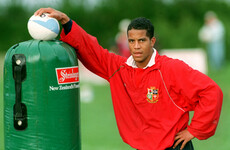IN YEARS GONE by, Jack Carty would head into the dressing room after Connacht games, listen to his coach, and then immediately take out his phone to find out what people were saying about him on social media.
There were times when he even searched his name on online rugby forums to take another look at how his performances were being rated.
Firmly out of the habit now at the wise old age of 27, the Ireland international out-half didn’t recognise at the time just how poisonous it was.
Negative comments like ‘Jack Carty was shite’ or ‘Why is Jack Carty our out-half, can we not get someone else?’ would gnaw away at the young out-half.
On the flip side, Carty also took gushing praise after good performances too seriously.
He’s the latest player to feature in the ‘Tackle Your Feelings‘ campaign run by Rugby Players Ireland, with the Athlone man detailing how he let social media make too much of an impact on him.
“I would have done it after every game,” said Carty on a video call this morning.
“I’d have waited until after the coach spoke. If it was after a loss where you don’t want to be seen on the phone, you’d kind of turn into the corner or your locker and type your name into Twitter.
“The first five or six things you read would have dictated how the game went in your mind, that’s how I saw it back in the day.
“I would be on Boards and typing in my own name and I used that to see how I was getting on as a player.
“It can go the other way as well – if you play one good game, you can think you’re the best player in the world.
“I probably let the positive parts over-amplify in certain circumstances and when I got negative stuff, I let it dictate how I felt for three or four days. I looked for validation not from coaches or players but maybe from people online.”
Looking back now, Carty realises that reading too much into the social media commentary negatively impacted his performances.
“It would have affected my outlook on how I went into the next week because I would have had a hangover effect from the previous week and reading about myself,” said Carty.
“For that Monday, Tuesday, Wednesday, it would have been at the forefront of my thinking coming into training – thinking that I’d played a bad game and building up these cortisol levels about making a mistake being brought up in a meeting but they were literally nothing, just some person’s opinion online.
“I remember with my girlfriend at the time, say after a Friday game, my weekend would have been ruined because I would be thinking about what a certain person had said. It probably did affect how my performances went because it affected my preparation the following week.”
Carty recalls how he came face-to-face with someone who had been very critical of him for a long period but whose negative comments had suddenly stopped amidst the out-half’s excellent form last season.
“On Facebook of all things, there was a certain individual who I mention in the video that, over a period of time, had written stuff. I remember it was so unhealthy for me, I actually had screenshots of what this person had said on my phone.
“I was using it as a thing for motivation. Some people might think that’s the right thing to do but I was on my holidays in Greece and I was looking at what this person had said to try and motivate myself to get better.
“You can see in the video that there was a function I was at and I saw this fella. He said, ‘Howiya Jack’ and I was thinking, ‘Will I say something to this person because I’ve obviously had this at the forefront of my thinking for such a long time.’
“I eventually said it: ‘Look, some of the stuff you said… and you’re not really writing anything about me anymore,’ and he goes, ‘That’s because you’re playing well.’
“When I look back on it now, the fact that I had spent so much time thinking about what I’d say to this person, it was such a liberating experience because I realised, ‘Why did I put so much thought and anxiety into what that person was saying?’ I could have controlled that at the very beginning if I had had the tools at the time.”
Carty has worked hard to build those tools in recent years, visiting sports psychologist Niamh Fitzpatrick, who helped him to focus on the fun in training and playing.
He says he uses the Tackle Your Feelings app extensively to monitor his mood and balance his feelings around rugby. Keeping in touch with his support network – family and friends – is key too.
Carty would “love to say it was like flicking a switch” in terms of moving past allowing online comments to impact on him, but reckons it took 18 months of incremental steps to build up resilience.
“All the things I had done stacked up on top of each other. People think success looks like that [he signals a constant rise with his arm], but it’s really like this [ups and downs] and you manage to get to where you are. It’s about peaks and troughs.
“You’re never as good as you think you are and never as bad as you think you are.
“This variety of tools took the emotion out of when I played well and when I played poorly. That kind of kept me in equilibrium and I tried to get some level of consistency in my performance and that was done through preparing my week, having goals every week, and motivating myself to get better.
“Since that, I’ve went down and dipped again but fortunately enough, I’ve bounced back again. There have been times, like after the World Cup where I probably didn’t play as well as I could have, but I had the ability to speak to people and it made it a lot easier.”
Carty feels these tools are more important than ever in the current situation the world finds itself in, with people unable to physically meet friends and loved ones.
“I suppose you’re cooped up in the house now so external from rugby your mental health… things that I’ve done like reaching out to family, Skyping, video calls.
“Just because you’re away from someone doesn’t mean you can’t talk to them.”
Tackle Your Feelings ambassador Jack Carty is encouraging people to be supportive and avoid trolling or scaremongering when using social media, especially now following the outbreak of the global pandemic, Covid-19. Jack is lending his support to the #ImTakingControl campaign which encourages people to ‘Take Control’ of their mental wellbeing using principles from both sport and positive psychology.














Hardly world beaters, especially going forward
@COYBIG: two evenly matched teams tomorrow so
I think travelling to Georgia will affect them. It’s a long journey. We have a chance.
@prop joe: good pt. I had not considered that. I think we will beat them.
Havent lost to these since 92. No Bale wine rate since 2012 is 9%.
Believe
Coybig
We will beat this shower tomorrow COYBIG! The welsh think the only have to turn up to beat us!
Whats the team photo about?
@Jane: It’s something Wales have been doing for a couple of years now as a bit of a joke, they deliberately take terrible team photos. Go back through all their qualifiers and you’ll see some with one player kneeling and the rest standing, and the opposite. Leaving gaps like that etc. No idea what it’s about.
@Eanna Costello: I’d never noticed it before, thanks
@Eanna Costello: I think they did one bad photo by mistake and just kept it going then for a laugh
@Jane:
More examples here. It’s gas really.
https://www.rte.ie/sport/soccer/2017/1008/910725-the-wonders-of-the-wales-team-photo-what-is-going-on/
Seems like you guys think you have this in the bag already.
To put some perspective here – Wales have lost 3 games since 2013 when Bale wasn’t playing. Two of those were friendlies when other players including Ramsey were also not available, and the other one was after we’d already qualified for the Euros.
We haven’t lost a game since the 2016 Euros Semi final, we’ve kept a clean sheet for the last 3 games which we won, and tomorrow night we’re playing at home.
So despite the dismissive remarks above, Wales may pull off a huge upset.
@Saul Hamilton Evans: “not world beaters” “evenly matched” “we have a chance”. How is that us thinking its in the bag or dismissive of Wales? I think nearly all Irish fans thinks Wales are favourites but as said above, we go to Cardiff with a chance.
@Paul P O’Sullivan: is focain bómán é.
He’s a clown